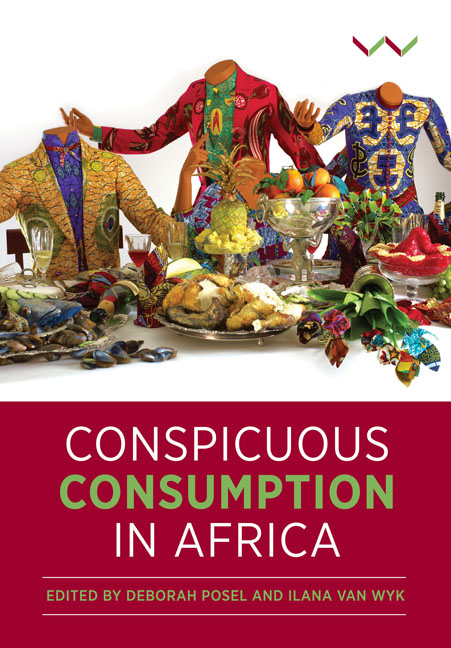Book contents
- Frontmatter
- Contents
- Acknowledgements
- List of Illustrations
- 1 Thinking With Veblen: Case Studies From Africa's Past and Present
- 2 Changes in the Order of Things: Department Stores and the Making of Modern Cape Town
- 3 Conspicuously Public: Gendered Histories of Sartorial and Social Success in Urban Togo
- 4 Etienne Rousseau, Broedertwis and the Politics of Consumption Within Afrikanerdom
- 5 Recycling Consumption: Political Power and Elite Wealth in Angola
- 6 Chiluba's Trunks: Consumption, Excess and the Body Politic in Zambia
- 7 Jacob Zuma's Shamelessness: Conspicuous Consumption, Politics and Religion
- 8 Precarious ‘Bigness’: a ‘Big Man’, His Women and His Funeral in Cameroon
- 9 Young Men of Leisure? Youth, Conspicuous Consumption and the Performativity of Dress in Niger
- 10 Booty on Fire: Looking at Izikhothane With Thorstein Veblen
- 11 Conspicuous Queer Consumption: Emulation and Honour in the Pink Map
- 12 The Politics and Moral Economy of Middle-Class Consumption in South Africa
- 13 Marigold Beads: Who Needs Diamonds?!
- Contributors
- Index
4 - Etienne Rousseau, Broedertwis and the Politics of Consumption Within Afrikanerdom
Published online by Cambridge University Press: 29 October 2019
- Frontmatter
- Contents
- Acknowledgements
- List of Illustrations
- 1 Thinking With Veblen: Case Studies From Africa's Past and Present
- 2 Changes in the Order of Things: Department Stores and the Making of Modern Cape Town
- 3 Conspicuously Public: Gendered Histories of Sartorial and Social Success in Urban Togo
- 4 Etienne Rousseau, Broedertwis and the Politics of Consumption Within Afrikanerdom
- 5 Recycling Consumption: Political Power and Elite Wealth in Angola
- 6 Chiluba's Trunks: Consumption, Excess and the Body Politic in Zambia
- 7 Jacob Zuma's Shamelessness: Conspicuous Consumption, Politics and Religion
- 8 Precarious ‘Bigness’: a ‘Big Man’, His Women and His Funeral in Cameroon
- 9 Young Men of Leisure? Youth, Conspicuous Consumption and the Performativity of Dress in Niger
- 10 Booty on Fire: Looking at Izikhothane With Thorstein Veblen
- 11 Conspicuous Queer Consumption: Emulation and Honour in the Pink Map
- 12 The Politics and Moral Economy of Middle-Class Consumption in South Africa
- 13 Marigold Beads: Who Needs Diamonds?!
- Contributors
- Index
Summary
At the beginning of Rip van Wyk, South African filmmaker Jamie Uys’ 1960 remake of Washington Irving's Rip van Winkle story (Uys 1960), an Afrikaner farmer who has been asleep for 100 years wakes up (the year is 1959) to discover that a hyper-modern, gleaming factory has been built on his former farm. In an amusing scene, a bewildered Rip van Wyk walks through the factory and imagines himself to be under attack by its hissing and belching machinery. He then makes his way to the centre of a bustling and sleek downtown shopping district, where modern cars zip past alarmingly and stylishly dressed shoppers walk in and out of shops stocked with an abundance of consumer items. Uys shot these scenes in the then freshly built company town of Sasolburg, established in the early 1950s by the oil company Sasol – one of the apartheid state's prestige projects – on coalfields and farmlands in what was then the northern Orange Free State province of South Africa, about an hour's drive from Johannesburg.
Through much of the next few decades, Sasolburg became a key site for the elaboration of a new modernised Afrikaner identity and imaginary: what I have dubbed the Apartheid Modern (Sparks 2012). Sasol managers, such as Etienne Rousseau, saw themselves as modernisers responsible for transforming platteland Afrikaners into modern subjects. Neglected by historians, Rousseau was a prominent and memorably dyspeptic critic of wasteful consumption under apartheid. Consumption was necessarily a central component of the nationalist modernising push. One of the ways in which Sasolburg was celebrated under apartheid was as a space where white residents – primarily, though not exclusively, Afrikaners – would be incorporated into a racially circumscribed, propertyowning utopia, analogous in some ways to the similarly circumscribed ‘Consumer Republic’ described by Lizabeth Cohen for the post-war United States (Cohen 2004). Thorstein Veblen (2007 [1899]) did not anticipate this: with his narrow focus on status- seeking and ‘pecuniary emulation’ he was conspicuously uninterested in the ways in which nationalist politics might facilitate the embrace of consumption as a marker of national prowess, as a vehicle for ethnic catch-up, or for the development of particular kinds of ‘citizen-consumers’ (Cohen 2004; Maclachlan & Trentmann 2004; Posel 2010).
- Type
- Chapter
- Information
- Conspicuous Consumption in Africa , pp. 63 - 78Publisher: Wits University PressPrint publication year: 2019



